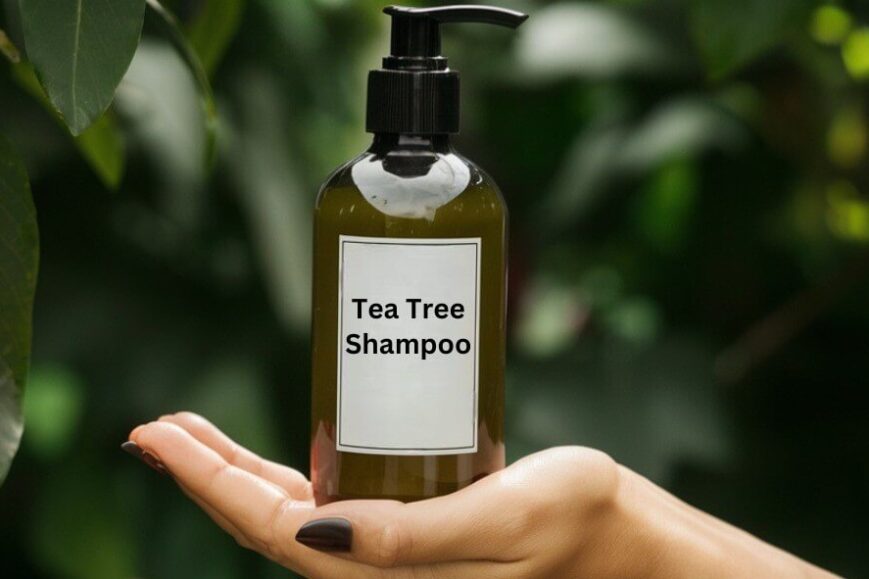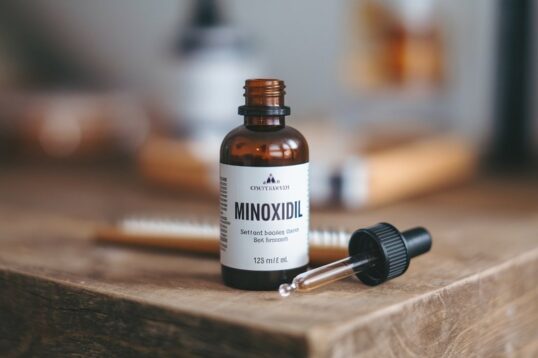Many people need to be aware that tea tree oil has been used for many years in hair treatment. The natural aspect of this remedy is gaining popularity in the beauty industry, and it is not just a fad; it’s a revolution.
In recent years, there has been much talk about using natural and plant-derived products for hair care as more and more people are turning towards organic and green products. Leading this trend is tea tree oil, a multifunctional plant-derived ingredient with unique characteristics that set it apart as a critical component of exceptional shampoos.
Due to its antibacterial, antifungal, and anti-inflammatory effects, tea tree oil has become popular as a treatment for common problems with the hair and scalp, such as inflammation, excessive seborrhea, and dandruff. As more people seek natural products for healthier hair, tea tree shampoos are gaining importance in addressing these concerns.
For those dealing with dry hair, incorporating tea tree oil into your hair care routine at home can provide effective relief by soothing the scalp and balancing moisture, making it a valuable component of your dry hair solutions.
Clarification
Tea tree shampoo is a hair treatment product containing tea tree oil, an essential oil obtained from the leaves of the Melaleuca alternifolia tree endemic in Australia. The Bundjalung people of Australia have been using tea tree oil in their remedies for centuries, focusing on skin conditions. Due to its antiseptic and anti-inflammatory capacities, tea tree oil is used in many products, such as shampoos, in the modern world.
For this purpose, tea tree shampoo is formulated to work on the scalp to clean and reduce dandruff while improving hair health properly.
How Tea Tree Shampoo Can Help to Enhance Hair Condition
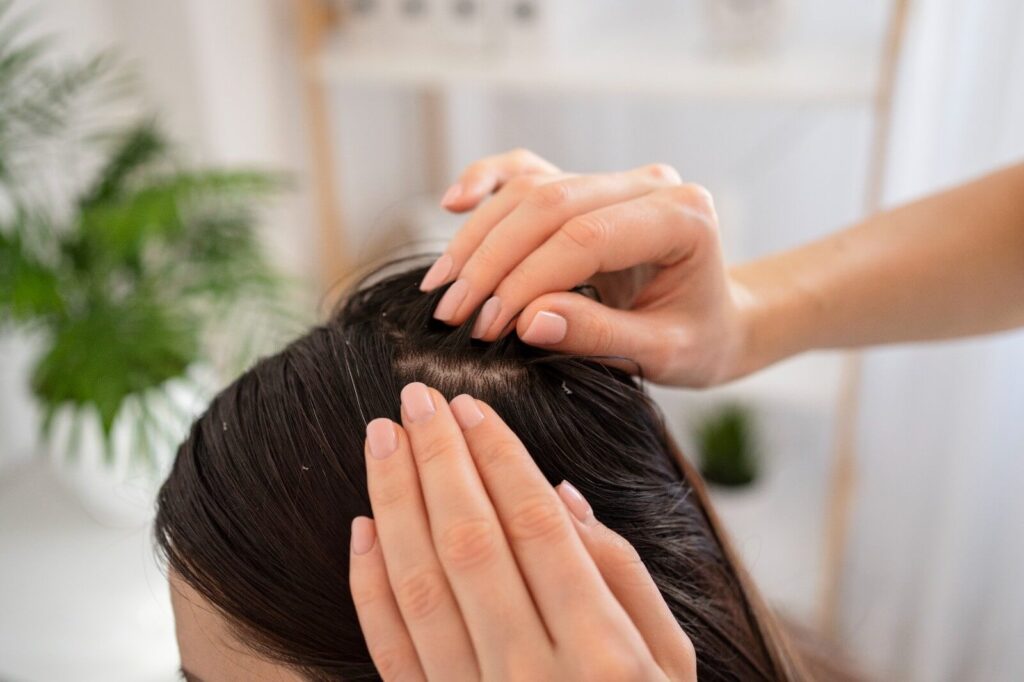
Tea tree shampoo can effectively address a range of typical hair and scalp issues due to the unique properties of its key ingredient, tea tree oil:
- Dandruff and Seborrheic Dermatitis: Tea tree oil is an antifungal and antimicrobial agent capable of dealing with Malassezia, which is predominantly responsible for dandruff and seborrheic dermatitis. Since this shampoo minimizes the concentration of fungi in the scalp area, it can help treat these health problems that cause flaking, scaling, and itchiness.
- Itchy, Irritated Scalp: Another usefulness of tea tree oil is its ability to reduce inflammation. Thus, the oil can help reduce inflammation on the scalp. In this regard, tea tree shampoo can effectively relieve the itch and inflammation of the scalp resulting from several conditions.
- Excess Oil and Buildup: Tea tree oil aids in removing sebum and other debris on the scalp, which may contribute to the blocking of pores and hair follicles. This assists in avoiding the development of dandruff and other issues that may stem from blocked pores on the head.
- Hair Loss and Thinning: Tea tree oil can help stimulate hair growth and decrease hair loss through improved scalp conditions and blood flow. Since tea tree shampoo gets to the root cause of problems like fungal infections, inflammation, and clogged follicles, it helps promote healthy hair growth.
Tea tree oil has antibacterial, antifungal, and anti-inflammatory properties that make it an excellent natural treatment for hair and scalp problems. Using a tea tree shampoo can achieve a balanced and healthy scalp and enhance the texture and shine of hair.
If you’re using tea tree shampoo to treat dandruff or scalp conditions, you may use it 2-3 times a week until the issue improves, then reduce the frequency.
Choosing the Right Tea Tree Shampoo
Selecting the right shampoo depends on your hair type and needs. Here’s a guide to help you choose:
Hair Type Considerations
- Oily Hair: Choose a tea tree shampoo that successfully clears the skin and unclogs the pores but does not overdry the scalp. Adding a few dots of Peppermint Oil for hair growth to the formula can assist with managing oily hair and keep your scalp cool.
- Dry Hair: Choose a tea tree shampoo with moisturizers like aloe vera or argan oil added. These ingredients will assist in hydration and conditioning hair while the tea tree oil cleanses the scalp.
- Normal Hair: A balanced tea tree shampoo that does not contain a very high percentage of tea tree oil must be used. It should cleanse effectively without disrupting the natural pH balance of the hair and the scalp.
- Sensitive Scalp: Select a mild tea tree shampoo with additional healing components such as chamomile or lavender oil. Ensure the formula does not contain abrasive ingredients, sulfates, or parabens so as not to cause sensitivity.
Reading Labels
When selecting a tea tree shampoo, it’s essential to read the labels carefully to ensure you’re getting a high-quality product. Here are some tips:
- Concentration of Tea Tree Oil: Choose a shampoo with tea tree oil as one of the first five components. This ensures a more focused approach and greater effectiveness.
- Absence of Harmful Additives: Do not use shampoos with sulfate, paraben, or synthetic fragrance, as these are detrimental to the hair and scalp.
- Additional Beneficial Ingredients: Look for shampoos that contain other natural elements like aloe vera, peppermint oil, and vitamins, which will complement the shampoo’s detoxifying function.
How to Use Tea Tree Shampoo
Tea tree shampoo is an amazing product that many people use to clean their hair. The following is information on how to use it.
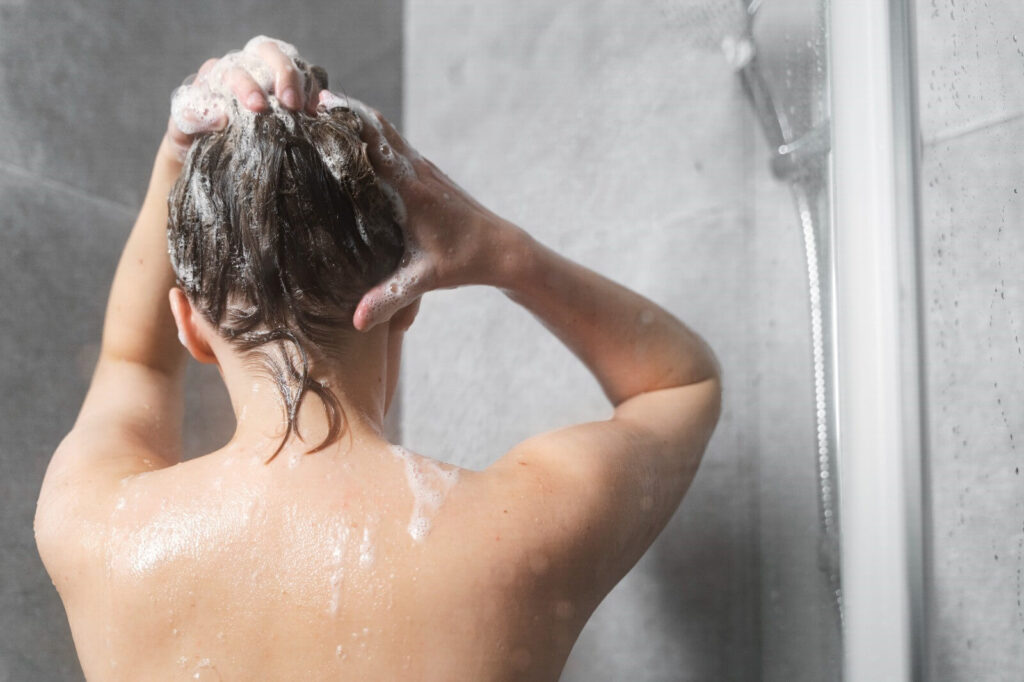
Wet Your Hair: First, it is necessary to apply warm water to the hair while washing it. This assists in implying a force correctly so that the hair cuticles can be opened and the shampoo is distributed evenly all over the hair.
Shake the Bottle: If your tea tree shampoo contains natural ingredients, shake the bottle a little to disperse some of the sediments.
Dispense Shampoo: Wet your palm slightly and then pour a little bit of the shampoo into it. The quantity of shampoo required may depend on the hair length, but it will be enough to apply a circular, about a quarter-size amount.
Lather in Hands: Wet your hands before making them form a lather that you then use to apply to your hair. This helps to spread the product, especially in areas where it has not been well marketed.
Apply to Scalp: Instead of paying the most attention to the ends of your hair when applying the shampoo, ensure that you use it on your scalp. The primary concentration of oil and dirt is usually found on the scalp.
Massage Gently: Rub your fingertips around your head, moving the shampoo from the scalp forward and to the left or right for about 2-3 minutes. This assists in opening up new pores to increase blood flow and allow the tea tree oil to penetrate the scalp.
Rinse Thoroughly: After applying shampoo, massage the hair and rinse it off with lukewarm water until all the shampoo is gone. No residue should be left on the skin, as this can plug the pores and cause inflammation.
Second Wash (Optional): For extra-greasy hair, it is advisable to shampoo the hair again in order to get the best results. A second wash provides a deeper clean than a single wash.
Limit the use to once or twice a week to avoid over-drying your hair. Complement with a moisturizing conditioner.
Advantages
- Scalp Health
Tea tree shampoo is especially helpful for scalp problems because it can reduce inflammation and act as an antifungal agent. Tea tree oil soothes inflammation, assists in blackhead removal, and reduces redness and itching on the scalp. The resulting antifungal activity targets infections that lead to dandruff and other scalp ailments to promote cleanliness and proper scalp function.
- Dandruff Control
It is important to note that tea tree shampoo is quite effective in eliminating dandruff-related problems. Tea tree oil also has antifungal effects on the Malassezia fungus, which could be the reason for dandruff, and makes it work to lessen the flakes. Depending on the type of hair on the head, frequent use of shampoo containing tea tree oil would prevent the buildup of oil and dead skin cells on the head, which leads to the formation of dandruff.
- Hair Growth
Washing with tea tree shampoo would help increase hair growth and decrease hair loss. why keeping one’s scalp clean is paramount, as it does not allow hair follicles to become blocked when growing hair back. As part of the shampooing process, massaging encourages increased circulation to the scalp organs, such as hair roots, thus promoting healthier hair growth.
- Moisturizing and Soothing
Tea tree shampoo could benefit those with dry, scaly, itchy skin on the scalp since it has moisturizing qualities. Redness and inflammation are kept at bay while the skin is moisturized, thanks to the natural oils contained in tea tree oil. It also acts as an anti-inflammatory agent, which clears up irritation and relieves itching, which is perfect for individuals with sensitive skin on their scalps or those with dandruff. Daily use of the product may help achieve a well-moisturized scalp that would not feel dry after use.
Potential Side Effects and Precautions
While tea tree shampoo is usually safe for most people, there are possible side effects to be aware of:
- Allergic Reactions: somebody can be allergic to tea tree oil. Some of the signs that the skin of the head is infected include inflammation, itching, rash, and swellings around the head. If the condition depreciates, it can lead to a rash or anaphylaxis.
- Scalp Irritation: If the scalp is sensitive to other shampoos, then using tea tree shampoo is likely to cause reactions such as a burning or stinging sensation. This can be due to the strength of tea tree oil or any other extra constituent in the shampoo.
- Dryness: Excessive use of tea tree shampoo can cause dryness of the hair and scalp, depending on the formulation and lack of moisturizing substances.
If you use heat styling tools, always apply a heat protectant spray to shield your hair from damage caused by high temperatures.
Suggestions for Brands
Here are some respected brands known for their high-quality tea tree shampoos:
OGX Hydrating + Tea Tree Mint Shampoo:
This cleanser incorporates tea tree oil, mint, and milk proteins to accomplish an invigorating and moisturizing wash.
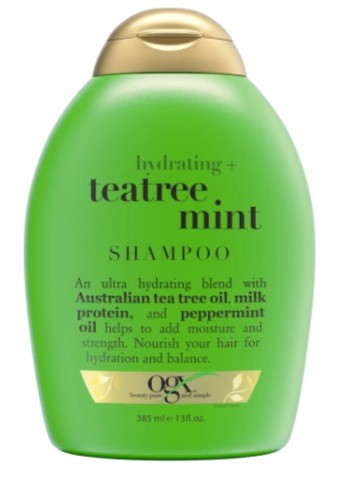
OGX Hydrating + Tea Tree Mint Shampoo:
Key Features:
- Designed to leave hair strong and healthy.
- Provides a fresh and long-lasting clean.
- Sweet peppermint, iced vanilla, and tea tree scent for an enjoyable wash.
- Free from parabens and sulfate-free surfactants for pure beauty.
Botanic Hearth Tea Tree Shampoo – Hair Care Shampoo for Men
Botanic Hearth Tea Tree Oil Shampoo and Conditioner Set is formulated with hair and scalp loving ingredients such as 100% pure tea tree oil, aloe vera, peppermint and lavender oils to promote healthy and strong hair and scalp.
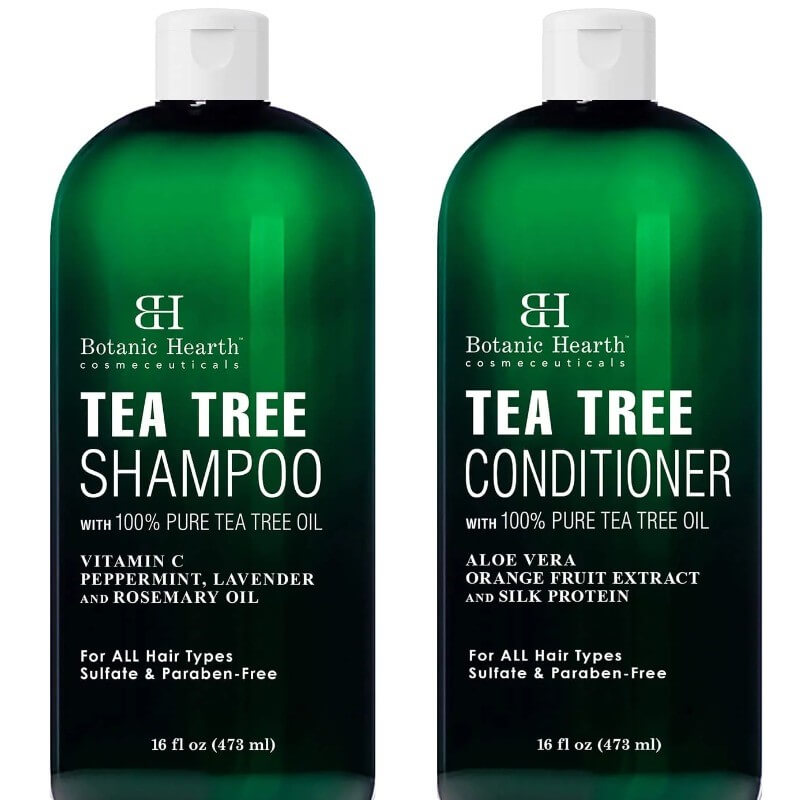
Botanic Hearth Tea Tree Shampoo – Hair Care Shampoo for Men
Key Features:
- Suitable for all hair types and textures, safe for color-treated hair.
- Free from harsh chemicals for a gentle cleanse.
- Soothes dry, itchy, and irritated scalp.
- Blend of lavender, peppermint, and tea tree oils for a clean scalp and glossy hair.
Neutrogena Tea Tree Oil Shampoo to Refresh & Moisturize Dry
Neutrogena Healthy Scalp Soothe & Calm Shampoo is specially formulated for dry, uncomfortable scalps. It soothes and moisturizes hair from root to tip, reducing scalp discomfort.
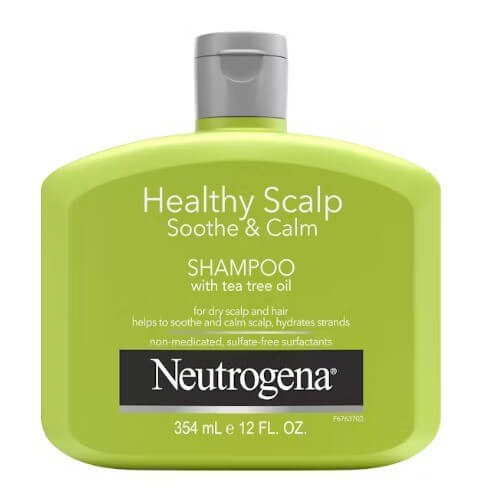
Neutrogena Tea Tree Oil Shampoo to Refresh & Moisturize Dry
Key Features:
- Treats hair from root to tip.
- Ideal for dry, uncomfortable scalps.
- Maintains the scalp’s natural barrier.
- Free from parabens, phthalates, sulfated surfactants, SLS, and SLES.
Tea Tree Scalp Special Shampoo
This leading brand has a tea tree range that stimulates human scalps, detoxifies the hair, and makes it more responsive to products.
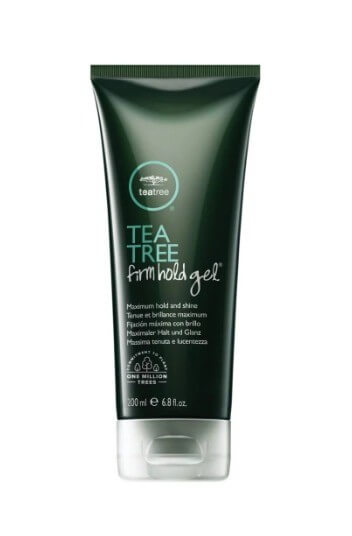
Tea Tree Scalp Special Shampoo
Key Features:
- tea tree oil rid hair of impurities and leave hair full of vitality and lustre.
- The refreshing tingle wakes up weary hair and spirits.
- Paraben free
- colour safe
Maple Holistics Tea Tree Shampoo
Maple Holistics Tea Tree Shampoo is a good choice for those who prefer sulfate-free and more natural shampoo. The product’s peculiarities include additional components such as lavender and rosemary.
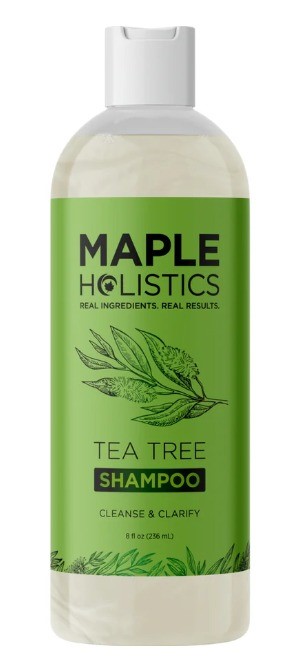
Maple Holistics Tea Tree Shampoo
Key Features:
- clarify and moisturize for flawless-looking hair
- Paraben free
- Dry scalp care
- Use men & women
Selecting the right tea tree shampoo will boost your hair care regime. It will help maintain healthy, clean hair without stripping it of all its nutrients.
Conclusion
Tea tree shampoo is a product that has several advantages when used for hair and scalp. From relieving dry and itchy scalps to fighting against dandruff and promoting overall healthy scalps, it has the benefits of both being antifungal and antibacterial, which will be suitable for any type of hair. It cleans the scalp effectively and strengthens hair, making it healthier and enabling the hair to feel fresh and rejuvenated. This makes tea tree shampoo an exceptional product in your shower in case you are struggling with scalp problems or desire to promote your hair’s natural sheen and health.
The prospect of enhancing the health of hair and scalp can be addressed with the help of tea tree shampoo. They are gentle and help address many hair and scalp problems without causing much harm. This is useful if you’re experiencing problems like dandruff or scalp issues or are just generally looking to improve the health of your hair. Try it out and let yourself reap the rewards. Your hair and your scalp will be grateful for the change.
FAQs
Will tea tree shampoo work on any hair?
Yes, tea tree shampoo will work on all kinds of hair. However, how often you use it and the formulation may differ according to your hair type. For instance, if you have oily hair, you can use it more frequently than those with dry hair.
How often should I shampoo with tea tree oil?
The commonness of application depends on your hair type and needs. Using it 2-3 times a week should suffice. If you have dry hair, it can be used less; with oily hair, it will be fine more often.
Will tea tree shampoo work for dandruff?
Yes, tea tree shampoo is remarkably effective against dandruff. It works on the Malassezia fungus, which causes dandruff in many cases, reducing flakes and preventing their comeback.
Can tea tree shampoo promote hair growth?
Tea tree oil shampoo can help with hair growth because it keeps your scalp healthy and clean, unblocks the hair follicles, and improves blood flow to the head. Thus, it creates a better and more favorable environment for healthier and stronger-growing hair.
Is tea tree shampoo safe on colour-treated hair?
Most tea tree oil shampoos are safe to use on colour-treated hair. However, one should be more cautious and read through product labelling for peculiar warnings and ingredients that would impact your hair colour. Look for formulations that are sulfate-free to minimize colour stripping.
Can I use tea tree shampoo with a sensitive scalp?
If you have a sensitive scalp, seek the gentle tea tree shampoo formula and patch test before regular applications. To decrease its potency, consider diluting the shampoo with a water mild, fragrance-free one.
How do I handle an allergic reaction caused by tea tree shampoo?
If there is redness, itching, or swelling as part of an allergic reaction, discontinue use and rinse your scalp with plenty of water. If it persists or worsens, seek a healthcare professional,
